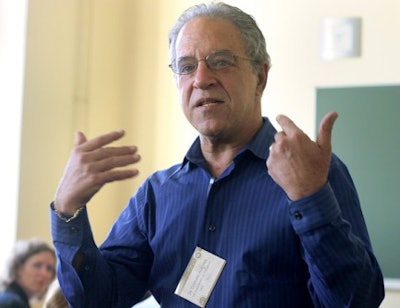 Dr. Clifford Adelman, IHEP senior associate and the report’s author, says Project Win-Win is a unique undertaking.
Dr. Clifford Adelman, IHEP senior associate and the report’s author, says Project Win-Win is a unique undertaking.With the conclusion of Project Win-Win, one of the first Obama-era national nonprofit initiatives designed to help restore the U.S. as the world’s top performer in producing college graduates, its organizers say the campaign bestows a “roadmap” for states and higher education institutions to follow in developing degree completion data systems for tracking past and current students.
Released on Wednesday by the Washington-based Institute for Higher Education Policy (IHEP), the report titled Searching for Our Lost Associate’s Degrees: Project Win-Win at the Finish Line documents how the nearly four-year initiative resulted in 4,550 people being awarded associate degrees they had previously earned but had not claimed. The project, which involved 50 two-year and 10 four-year institutions in nine states, also recruited 1,668 former students to return to school to complete a few credit hours of coursework to obtain their degree.
“Quite frankly, nothing like Win-Win had ever taken place over the 40 years of my work in U.S. higher education, certainly not at the scale of its institutional involvement, let alone with associate’s degree templates,” writes report author and IHEP senior associate Dr. Clifford Adelman in describing the project’s undertaking.
Launched in 2009, Project Win-Win focused on helping community colleges and four-year public institutions identify former students whose academic records qualified them for an associate degree and awarding those degrees retroactively. In addition, the participating schools identified former students who had fallen a few credits short of a two-year degree and sought to re-enroll them so that they could earn their degree. The four-year institutions were chosen as participants because they were authorized to award two-year degrees.
The project required some 200 people who worked in teams at the participating schools and who were tasked to conduct painstaking work to build information databases on former students dating back to the early 2000s. Project schools are in Florida, Louisiana, Michigan, Missouri, New York, Ohio, Oregon, Virginia and Wisconsin, according to IHEP.
The IHEP report indicates that a pool of 128,614 students came under scrutiny for the project, and the participating schools focused on 41,710 of them on which degree audits were conducted. The remaining 86,925 of the students had earned degrees or had re-enrolled at other institutions. Out of the 41,710, officials determined that 6,733 qualified as “eligible,” or those able to receive a degree retroactively, and 20,105 were deemed as “potentials,” meaning they were just a few credits shy of qualifying for a degree.
“This is really digging into the procedures within those institutions and within those states by which we track kids and figuring out who is going to get a degree and who is just shy of a degree,” Adelman told Diverse.
Among the recommendations Adelman included in the IHEP report are forward-looking measures that advise institutions to “refine degree audit systems so they can become standard institutional practice” and to continue to use the student tracking data systems developed for Project Win-Win for their current and future students.
“[Project Win-Win’s] success is that it gives you a map of what you’re in for” if you are a school administrator seeking to track former students who are eligible for an associate degree or are nearly complete with coursework, Adelman said.
“[Project Win-Win] gives you a map, and it tells you where all the potential road wash-outs are and where the hairpin turns are on the road in working through the data,” he noted.
Project Win-Win has been organized as a collaboration between IHEP and the State Higher Education Executive Officers organization and funded largely by the Lumina Foundation for Education. IHEP officials say the nearly $2 million Project Win-Win initiative emerged out of the national effort set in motion by the Obama administration to increase U.S. degree attainment and to develop strategies for increasing completion, particularly at institutions granting associate degrees.
Dr. Larry Zachrich, the Project Win-Win grant coordinator at Northwest State Community College in Archbold, Ohio, said his school participated in the project over a two-year period that ended this past June. Northwest State identified more than 400 former students who are either finished or very close to completing their associate degree requirements. He said that it’s common for students who transfer to four-year institutions to neglect making the effort to obtain their associate degree.
Zachrich, a retired business department dean at Northwest State, added that the discovery of degree completers and near-completers from the past decade has prompted school officials to examine their degree award policies such that the administration makes it nearly automatic for students to be awarded degrees once they meet their requirements. The possibility of waiving graduation fees and eliminating the graduation application process are some of the ideas school officials are considering.
“For the students in the grant, we decided internally that we would waive the graduation fee,” Zachrich said. “We expect to look into fee waiving and other ideas as we go forward.”





















